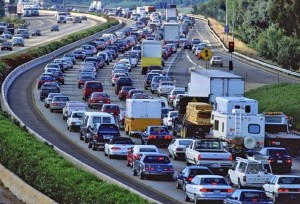If you’re like most Americans, you likely fire up your car when you head to work each morning. Then again, maybe not. A new study shows there are some substantial differences in how Americans commute, much of that depending upon where they live.
In New York, more than half of commuters hop on mass transit compared to less than 1% in Oklahoma City. Walking is gaining popularity in big cities, as is riding a bike. Telecommuting also is gaining ground, especially in tech-savvy communities like Portland and Austin.
When commuters head to work also can vary widely. Detroiters can be found flooding the freeways long before the crack of dawn, according to a study of commuting habits in the 30 largest American cities, conducted by the University of Michigan Transportation Research Institute.
(What gets your road rage going? Click Here to find out what frustrates American motorists most.)
For the U.S., overall, 95.5% of commuters have access to a motor vehicle – whether they use it or not. But that varies widely from city to city. It reaches a peak of 98.2% in Ford Worth, Texas and San Jose, California, according to the UMTRI study, and a low of just 54% in New York City.
Not surprisingly, Big Apple residents also are the most likely to skip the car when heading to work. A full 56.7% rely on buses, trains, ferries or other methods to commute. But in Oklahoma City, just 0.7% of workers rely on mass transit.
Public transit is gaining ground in a number of cities, but the UMTRI report also found greener alternatives picking up momentum – no surprise as more and more cities add bike-sharing services. Nearly 6% of Portland residents commute by bicycle, the highest figure in the country. In El Paso, Texas, however, the figure is a mere 0.1%.
Many Boston residents not only park their cars but skip the “T,” the local transit system. Despite the cities wicked winters, 14.5% of workers there walk to the office. In Fort Worth, however, only 1.2% are relying on leg power to commute.
(New study blames 25% of cars on the road for 90% of the pollution. Click Here for more.)
With mass transit limited in many cities, and sprawl limiting other alternatives, carpooling is another option for many Americans. But despite incentives like the diamond lanes offered in cities such as Washington, D.C. and Los Angeles, it’s still not a significantly popular choice for most Americans. In another surprise, UMTRI researchers discovered carpooling is most popular in Memphis, where 12.4% of workers share a ride. Unless you count the subway, only 4.9% of New Yorkers carpool.
How about skipping the commute entirely? Portland and Austin lead the way, with 7.1% of employees working from home. Telecommuting accounts for just 2.1% of workers in Memphis, however.
Across the country, the University of Michigan study found commuters spend an average 35.8 minutes daily getting to and from the job. Oklahoma City has the shortest commute, at just 20.7 minutes, while New Yorkers spend nearly twice as much time in transit at 39.7 minutes.
As to when they head out on the highway, 71% of American commuters leave home between 5:00 and 8:59 AM. The percentage is highest in Jacksonville, Oklahoma and Nashville, and lowest in Detroit and Las Vegas.
That should come as no surprise in Sin City where casinos and entertainment jobs dominate – and run on their own time. In the Motor City, factory jobs often require motorists to turn out extremely early – or for the second and third shifts. A full 35.9% of Detroiters head to work later in the day.
Unfortunately, the new study does not show how commuting patterns have been changing over the years, though other research has found a growing number of Americans turning to alternatives, whether riding mass transit, riding bikes or working from home.
(Women are driving more miles than ever in the U.S. Click Herefor more.)


I’ve said for years that if the folks who drive north 30 minutes or more to reach their place of employment and the people who do the same headed South, along with East/West were to swap residential locations, you could drastically reduce traffic congestion and fuel consumption and have happier commuters.
With current motor vehicle operators being so driving impaired and hostile, it’s no wonder we don’t have more accidents and road rage. IME it’s literally a combat zone out there and getting worse by the week. The longer you are on the roadways the higher you chance of being in an accident or shot.